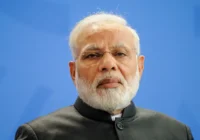We live in a brave new world. Smartphones unleashed a new digital age with the internet at everyone’s fingertips. With developments like non-fungible tokens (NFTs), the metaverse and especially artificial intelligence (AI), we now live in a “new” new digital age.
The distinction between the real world and the digital world is getting blurrier by the day, especially in technologically advanced societies. India is no exception. Today, 840 million Indians are online and another 400 million Indians will enter the digital world by 2025.
Adoption of digital technology is accelerating in India
India being India, some of the numbers are truly mind-boggling. Internet connections have increased by 250% in the last nine years. The cost per gigabyte of data has dropped by a dramatic 96%. Under the Pradhan Mantri Jan Dhan Yojana financial inclusion campaign, Indian banks have opened 500 million new accounts and issued 330 million debit cards powered by India’s financial services and payment system, RuPay.
Today, India is the world leader in global digital payments with 90 million transactions in 2022. The Unified Payments Interface, an instant payment system, has taken off with transactions worth 35 trillion rupees ($430 billion) to date. A striking 46% of global digital payments are made in India.
India has issued 1.38 billion Aadhaar national identity cards, creating the world’s largest digital identity system. This allowed for the vaccination of 2.2 billion people during the COVID pandemic.
Not only the scale, but the pace of digitalization has been breathtaking. Transaction volume has increased by 50 times in the last five years. With over 600,000 km of fiber optic cables already laid, India has become a digital nation overnight. It has also been unique in setting up a public-private partnership to create an open-access digital public infrastructure for its people. Pioneers of the internet in the US have lauded India’s approach.

India Boldly Asserts Independence with New Technology
Global risks in the digital world
New technologies create new opportunities for crime.
The 2022 Interpol Global Crime Trend Summary Report declares “very high expectations of future escalation” for ransomware, phishing, online scams, hacking and online child sexual abuse. Terrorists now use the dark web to hide their identities and spread radical material. They use cryptocurrencies to move money around. The metaverse, too, is creating new opportunities for propaganda, recruitment and training. AI is making deep fakes ever more difficult to identify.
Cyberattacks, notably ransomware and distributed denial of service attacks, are leading to “disruption, data breaches, and financial loss,” according to Interpol. Digital extortion has become the newest form of blackmail. Critical information and financial systems are at grave risk. Given how much of our lives is now digital, the disruption of an online network—banking, airlines, identity systems et al.—could bring nations to a standstill. The worst scenarios of digital disruption could include crashing planes, setting off missiles or worse.
A much-cited 2019 report by Accenture estimated that cybercrime could cost the world $5.2 trillion over the next five years.
In a nutshell, the risks are immediate, serious and rising.
We must establish basic rules of internet governance and public digital infrastructure security. Governments will need to more precisely define digital ownership, monitor the dark web and provide guidelines for responsible AI use.
Prime Minister Narendra Modi has outlined a uniform cyber strategy for the country. This involves building capacity, systems and expertise throughout the country to deal with cyber threats. Detection and prevention is the name of the game instead of chasing the horse after it has bolted from the gate.
But no nation can control cybercrime alone. The international community must work together to formulate uniform legal standards and best practices. We need global cooperation, not unilaterality, on cyber security benchmarks. This will increase interoperability, trust and reduce the agency protocol and resources gaps. Real-time cyber threat intelligence sharing between governments is indispensable. In fact, governments alone will not be able to achieve cyber security. We need the active involvement of corporations too.
Together, we must create a cyber success world, not a cyber failure world. The promise of new technologies must outweigh the peril. Let us come together in the spirit of Vasudhaiv Kutumbukam—the world as one family—to create a secure and prosperous digital future for all.
[This piece is based on a speech given by Home Minister Amit Shah at the G20 conference on “Crime and Security in the Age of NFTs, AI and the Metaverse” on July 13, 2023, in Gurugram, India.]
[Anton Schauble and Lane Gibson edited this piece.]
The views expressed in this article are the author’s own and do not necessarily reflect Fair Observer’s editorial policy.
Support Fair Observer
We rely on your support for our independence, diversity and quality.
For more than 10 years, Fair Observer has been free, fair and independent. No billionaire owns us, no advertisers control us. We are a reader-supported nonprofit. Unlike many other publications, we keep our content free for readers regardless of where they live or whether they can afford to pay. We have no paywalls and no ads.
In the post-truth era of fake news, echo chambers and filter bubbles, we publish a plurality of perspectives from around the world. Anyone can publish with us, but everyone goes through a rigorous editorial process. So, you get fact-checked, well-reasoned content instead of noise.
We publish 2,500+ voices from 90+ countries. We also conduct education and training programs
on subjects ranging from digital media and journalism to writing and critical thinking. This
doesn’t come cheap. Servers, editors, trainers and web developers cost
money.
Please consider supporting us on a regular basis as a recurring donor or a
sustaining member.
Will you support FO’s journalism?
We rely on your support for our independence, diversity and quality.







Comment